新概念英语 L139-140 (宾语从句)
新概念一L139-140讲义练习
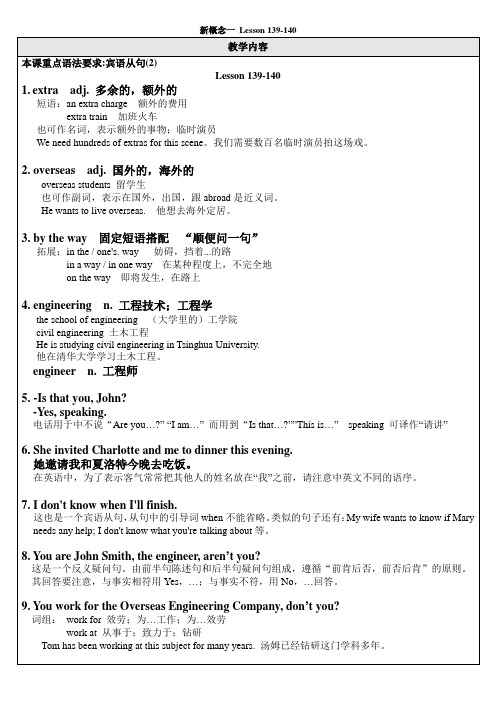
新概念一Lesson 139-140教学内容本课重点语法要求:宾语从句(2)Lesson 139-1401.extra adj. 多余的,额外的短语:an extra charge 额外的费用extra train 加班火车也可作名词,表示额外的事物;临时演员We need hundreds of extras for this scene。
我们需要数百名临时演员拍这场戏。
2. overseas adj. 国外的,海外的overseas students 留学生也可作副词,表示在国外,出国,跟abroad是近义词。
He wants to live overseas. 他想去海外定居。
3. by the way 固定短语搭配“顺便问一句”拓展:in the / one's. way 妨碍,挡着...的路in a way / in one way 在某种程度上,不完全地on the way 即将发生,在路上4. engineering n. 工程技术;工程学the school of engineering (大学里的)工学院civil engineering 土木工程He is studying civil engineering in Tsinghua University.他在清华大学学习土木工程。
engineer n. 工程师5.-Is that you, John?-Yes, speaking.电话用于中不说“Are you…?”“I am…”而用到“Is that…?””This is…”speaking 可译作“请讲”6. She invited Charlotte and me to dinner this evening.她邀请我和夏洛特今晚去吃饭。
在英语中,为了表示客气常常把其他人的姓名放在“我”之前,请注意中英文不同的语序。
7. I don't know when I'll finish.这也是一个宾语从句,从句中的引导词when不能省略。
新概念英语第一册L139~140
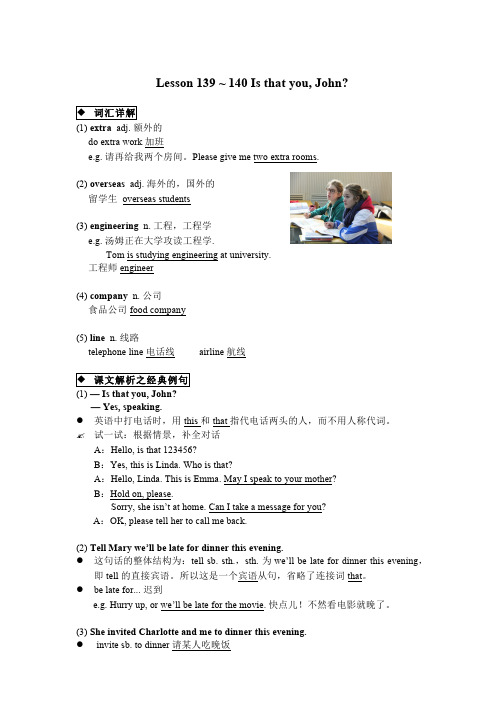
Lesson 139 ~ 140 Is that you, John?!词汇详解(1) extra adj. 额外的do extra work 加班e.g. 请再给我两个房间。
Please give me two extra rooms.(2) overseas adj. 海外的,国外的留学生 overseas students(3) engineering n. 工程,工程学e.g. 汤姆正在大学攻读工程学.Tom is studying engineering at university.工程师engineer(4) company n. 公司食品公司 food company(5) line n. 线路telephone line 电话线 airline 航线!课文解析之经典例句(1) — Is that you, John?— Yes, speaking."英语中打电话时,用this和that指代电话两头的人,而不用人称代词。
#试一试:根据情景,补全对话A:Hello, is that 123456?B:Yes, this is Linda. Who is that?A:Hello, Linda. This is Emma. May I speak to your mother?B:Hold on, please.Sorry, she isn’t at home. Can I take a message for you?A:OK, please tell her to call me back.(2) Tell Mary we’ll be late for dinner this evening."这句话的整体结构为:tell sb. sth.,sth. 为we’ll be late for dinner this evening,即tell的直接宾语。
所以这是一个宾语从句,省略了连接词that。
新概念第一册 Lesson139-140
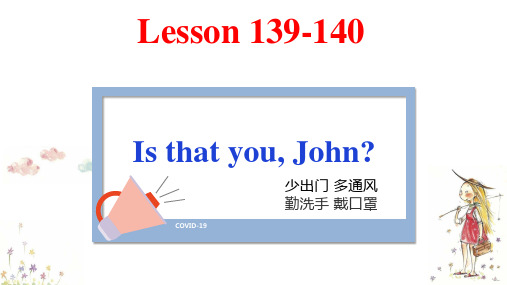
Language points
1.Is that you,John? (口语化的电话用语) 正式用语:Is that John speaking? Excuse me. I’d like to speak to John. 【电话用语】我是.... This is ....(speaking)./It's ...here./It's ...speaking. 你是谁?
He asks, “Are you tired?” He asks if/ whether you are tired.
Grammar
特殊疑问句情况:
引语为特殊疑问句时,引导词要使用特殊疑问词来引导。 从句使用陈述语序。
“What are you reading?” He wants to know what you are reading.
Language points
4.She invited Charlotte and me to dinner this evening. ①invite sb to dinner 请某人吃饭 eg:I invited my teacher to dinner. ②invite sb to one’s house 请某人到家里作客 eg:He invites me to his house. 5.You work for the overseas …… work for + 机构名称 为…工作 work in+ 工作地点 在...工作 eg:My father works in a big company.
Listen and Read
JOHN SMITH:I don't know what you're talking about. GRAHAM TURNER:That is John Smith, isn't it? JOHN SMITH:Yes, I'm John Smith. GRAHAM TURNER:You are John Smith, the engineer, aren't you? JOHN SMITH:That's right. GRAHAM TURNER:You work for the Overseas Engineering Company, don't you? JOHN SMITH:No, I don't. I'm John Smith the telephone engineer and I'm repairing your telephone line.
新概念英语第一册Lesson139-140笔记(语法点+配套练习+答案)
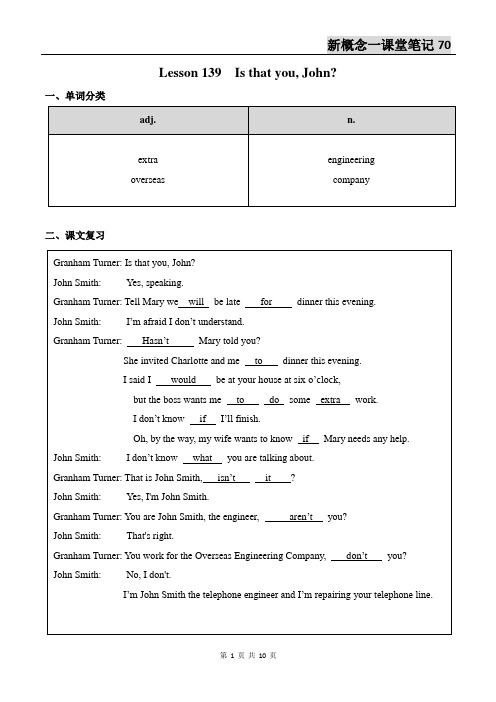
做......迟到
by the way
顺便问一句
invite sb. to dinner
请某人吃饭
talk about sth.
谈论某事或某人
want sb. to do sth.
想让某人做某事
work for
为......工作
do extra work
加班
telephone line
宾语从句是特殊疑问句,连接词用特殊疑问词,语序为陈述语序,不可省略
1.What is the girl?
I want to knowwhatthe girl is.
2.When does Tom get up?
I want to knowwhenTom gets up.
3.Where have you been?
I want to knowifthe girl is a student.
2.Does Tom get up at 6 a.m.?
I want to knowifTom gets up at 6 a.m..
3.Have you been overseas?
I want to knowifyou have been overseas.
在国外be overseas
There area lot of overseas studentsin this university.这所大学有很多留学生。
Johnwill work(work) overseas soon.
John马上就要出国工作了。
Ihaveneverbeen(be) abroad before.
请你再拿一瓶牛奶好吗?
OnSundays, she always gets someextrasleep.
新概念英语 L139-140 (宾语从句)

“I can’t do this Maths problem.”
He told me (that) he couldn't do this Maths problem.
16
What did _______ tell you?
17
What did _______ say?
18
What did she tell you? “I may return at six o’clock.” She told me (that) she might return at six o’clock.
祈使句
直接引语是祈使句,则改为 tell/order/ask sb. to do sth. not to do sth. 1. He said, “Please come here tomorrow.” He asked me to go there the next day. 2. The teacher said, “Don’t talk any more.” The teacher told us not to talk any more.
28
The doctor asks, “Do you have a headache?”
if/whether I The doctor asks ____________ have a headache.
29
She asks, “What is he doing?”
She asks _______ what he is doing.
19
What did he tell the boy? “You may hurt yourself.”
He told the boy he might hurt himself.
新概念英语-L139-140----(宾语从句)(共35张PPT)
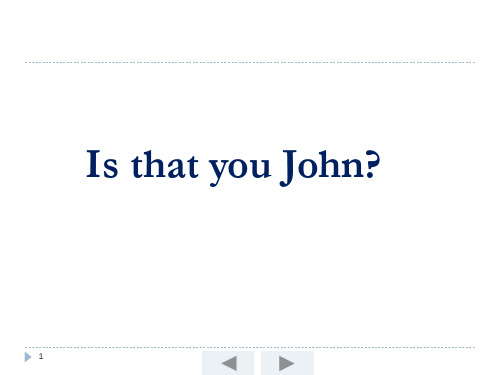
• telephone line
电话线路
• a telegraph line
电报线路
• {交} line; route bus line
公共汽车线路
• airline
航空线路
Listen and Answer:
• 1.Isn’t Graham Turner speaking to John Smith?
The doctor asks i_f_/_w__h__e_t_h_e__rI have a headache.
13
Is he looking at my sister?
Dxx thinks if/whether YMHD is looking at his sister.
What does Daxingxing think?
5
直接引语时态
1
一般现在时 be/do
2 现在进行时
am/is/are doing
3 一般过去时
did
4 现在完成时
have done
5 过去完成时
had done
6 一般将来时
6 will do
间接引语时态
一般过去时 Was/were/did 过去进行时 Was/were doing 过去完成时 had done 过去完成时 had done
1. John said, “he may like stories. ” John said that he __m__i_g_h__t__ like stories.
2. She said to me, “I can’t have broken it. ” She told me that she _c_o__u_l_d_n__’t__h_a__v_e__b_r_o__k_e__n_it.
新概念英语Lesson 139-140讲义
New words
1.extra a.额外的
an ~ charge
an ~ train
2.overseas a/ad.海外的
~ students
Go ~
3.engineering工程
engineer工程师
pany公司
firm公司
5.line n.线
→ He wants to know why you are tired.
2.Are you reading ? what?
I want to know if you are reading .
Tell me if you are reading .
I want to know what you are reading.
~ sb to dinner /one’s house /one’s country
3.by the way顺便(说,问)
on the way在去---的路上
in the way挡路
in this way以这种方式
Lesson140He wants to know if/why/what/when
宾语从句(疑问句)
Tell mewhat you are reading.
Exercises
一、用when , if, that,why或what填空。
1. I am not sure _______ I will arrive inBeijing.
2. Sophie wants to know ________ you need her help.
宾语从句中如果是一般疑问句需要用if引导,特殊疑问句则用原特殊疑问词引导,并改成陈述句语序
新概念英语第一册自学笔记含课后练习答案:Lesson 139-140
新概念英语第一册自学笔记含课后练习答案:Lesson139-140新概念英语第一册139-140课课文重难点详解 further notes on the text1.tell mary we'll be late for dinner this evening. 你告诉玛丽,今晚吃饭我们将晚到一会儿。
句中we will be late…是一个宾语从句,作动词 tell的宾语。
这个宾语从句省略了引导词that。
late表示“迟到”的意思时通常作表语,与for连用。
2.by the way, 顺便(问、说一下)。
说话者忽然想到另一件事的时候用此来表示改变话题。
新概念英语第一册139-140课语法 grammar in use宾语从句(2)在以前已介绍过宾语从句一般由that, which和whom引导,它们有时在口语中能够省略。
除此之外,宾语从句还能够由when, where, what, why, how以及 if和 whether这些疑问词来引导,而它们在句中往往不能加以省略。
无论是that, if还是wh-疑问词引导的宾语从句通常都应以陈述句的形式出现。
请看例句:she wants to know when you'll have a bath.她想知道你何时洗澡。
i don't know where she lives.我不知道她住在哪儿。
he wants to know what you are cooking.他想知道你在做什么饭。
she wants to know why mary is late.她想知道玛丽为何迟到。
he wants to know if you are tired.他想知道你是否累了。
新概念英语第一册139-140课词汇学习 word study1.extra(1)adj. 额外的;外加的;另外收费的:could you get an extra bottle of milk?请你再拿一瓶牛奶好吗?on sundays, she always gets some extra sleep.星期天她总是比平时多睡一会儿。
新概念英语第一册Lesson139140IsthatyouJohn小学英语初中英语全国通用
Review
重点回顾
1. What will you do if you win a lot of money? >>> 2. If I win a lot of money I'll buy you a mink coat. >>> 3. If we win a lot of money we'll travel round the world
Lesson 139 & 140 Is that you, John?
Review
重点回顾
同学 ,一起复习一下 : 1. 条件状语从句 : 如果A发生了 , 那么B才会发生。
e.g. If I have a lot of money, I will travel round the world first. 如果我有很多钱 , 我首先会周游世界!
Language Point
语句讲解、课文讲解
连接词
4. Oh, and by the way, my wife wants to know if Mary needs any help. > > >
= Oh, and by the way, my wife wants to know whether Mary needs any help.
② 线路 , 管路 power line : 电线 , 输电线 ③ 诗歌 , 台词的一行 e.g. You need to read your line now.
你需要现在读一下你的台词。
④ 排队 , 排成一列 jump the queue : 插队
queue : 队伍
Vocabulary
词汇精讲
新概念英语1_Lesson139-140
Lesson 139 Is that you, JonnLesson He wants to know if/ why/ when……学员-王晨晨教师:李军力引入:大家有没有打电话拨错号的经历呢今天,我们要学习的课文就是这样一个故事。
一本课重点1 宾语从句2 反义疑问句二单词详解1 extraadj. 额外的,外加的She always gets some extra sleep on Sundays.星期天她总会多睡一会儿He has to do some extra work on weekends.Adv. 额外地;另外They’ll charge you extra for room service. 包间服务需要另外收费。
He usually works extra on weekends. 周末加班2 overseasadj. 海外的,额外的The country depends on overseas trade.Overseas students 留学生students aboardadv. 在海外,在国外He is going to work overseas.overseas 与abroadabroad本意是“出境”,overseas本意是“海外,在海的另一边”,如内陆国家出国就只能说go abroad,只有跨海的才是go overseas.因为中国的go abroad很多都是跨海的,如到美国就是go overseas,所以这两个词对中国人而言,很多时候可以通用,但对中亚的很多国家而言,那些人们去邻国就只能是go abroad,而不能是go overseas了。
overseas可以作形容词(adjective) 和副词(adverb),abroad做“出国”只可作副词。
’海外办事处’只能够译做an overseas office,不得说an abroad office;’在海外工作’则译做to work overseas或to work abroad都可以。
- 1、下载文档前请自行甄别文档内容的完整性,平台不提供额外的编辑、内容补充、找答案等附加服务。
- 2、"仅部分预览"的文档,不可在线预览部分如存在完整性等问题,可反馈申请退款(可完整预览的文档不适用该条件!)。
- 3、如文档侵犯您的权益,请联系客服反馈,我们会尽快为您处理(人工客服工作时间:9:00-18:30)。
They cried out whether he was all right.
35
特殊疑问句:
保留特殊疑问词做为连接词语序改为陈述句语序
• He said to me,“What's your name?” He asked me what my name was. • He asked us, “How many cinemas have been built in your country?” He asked us how many cinemas had been built in our country.
What did _______ say? “I must answer the phone.” She said she had to answer the phone.
22
What did she tell you? I must get up at early. She told me (that) she had to get up early.
“I can’t do this Maths problem.”
He told me (that) he couldn't do this Maths problem.
16
What did _______ tell you?
17
What did _______ say?
18
What did she tell you? “I may return at six o’clock.” She told me (that) she might return at six o’clock.
“We are doing the housework.”
They said (that) they were He said (that) he was doing the(that) housework. She said she was reading a book. watering the flowers.
6
What did she say? “I lost my keys yesterday.”
She said she (that) had lost her keys the day before.
7
What did he say?
“I finished my homework.” He said (that) he had finished his homework.
1
He says “I am tired.”
that he is tired. He says ________
2
He said “I am _____.” She said “I am ____.” They said “We are ______.” He said (that) he was cold. She said (that) she was sad. They said (that) they were tired.
28
The doctor asks, “Do you have a headache?”
if/whether I The doctor asks ____________ have a headache.
29
She asks, “What is he doing?”
She asks _______ what he is doing.
38
直接变间语中,要注意情太动词的变化
can – could can’t – couldn’t
will – would
may – might
won’t – wouldn’t
going to – would
must – had to
39
直接引语中的时间状语转换规则: now today tonight ago yesterday last night tomorrow next …
11
What did she tell you ? “We had taken lunch.” She told me (that) they had taken lunch.
12
What did _______ tell you ? He told me “I had taken a bath” He told me (that) he had taken a bath.
25
②直接引语是过去进行时,时态不变。如: Jack said. "John, Where were you going when I met you in the street?" →Jack asked John where he was going when he met him in the street。
→ He said (that) he left his book in your room.
32
一般疑问句 用连词whether或if引导,原主句中谓语动词 say要改为ask ,语序要变为陈述语序 • He said, “Do you have any difficulty with English?” • He asked (me) whether/if I had any difficulty with my English. • He said, “You are interested in English, aren't you?” • He asked whether I was interested in English.
19
What did he tell the boy? “You may hurt yourself.”
He told the boy he might hurt himself.
20
What did he tell you ?
He told me he might rob the bank.
21
26
③直接引语中有具体的过去某年、某月、某日 作状语,变为间接引语时,时态不变。如:
Xiao Wang said. "I was born on April 21, 1980." →Xiao Wang said he was born on April 21, 1980.
27
④直接引语如果是一般现在时。表示一种反 复出现或习惯性的动作,变间接引语,时态 不变。如: He said, "I get up at six every morning。" →He said he gets up at six every morning。
9
What did they say?
They said “We have seen the film.”
They said (that) they had seen the film.
10
What did the boy say? The boy said “I have broken the window.” The boy said (that) he had broken the window.
33
“Do you know my name?” She asked me
Whether / if
I knew her name.
“Are you at home yesterday?”
She asked me
Whether / if I was at home
the day before.
34
注意:大多数情况下,if ,whether 可以互换,但句中 出现or (not),或放在介词后作连接词,只用whether。
祈使句
直接引语是祈使句,则改为 tell/order/ask sb. to do sth. not to do sth. 1. He said, “Please come here tomorrow.” He asked me to go there the next day. 2. The teacher said, “Don’t talk any more.” The teacher told us not to talk any more.
6
24
直接引语转为间接引语时,下列情况下时态不变
①直接引语是客观真理。
"The earth moves around the sun and the moon moves around the earth,” the teacher told me.
→The teacher told me the earth moves around the sun and the moon moves around the earth.
“we met yesterday” He said (that) they had met the day before.
8
What did he say? “I have finished my homework.” He said (that) he had finished his homework.
• He asked, “Do you speak English or
French?”
He asked me whether I spoke English or
French.
• I asked, “Will you take bus or take train?”
I asked whether I would take bus or take train.
14
He said “It will snow tomorrow” They said “They will leave.” He said (that) it would They said (that) they would leave.” snow tomorrow.
